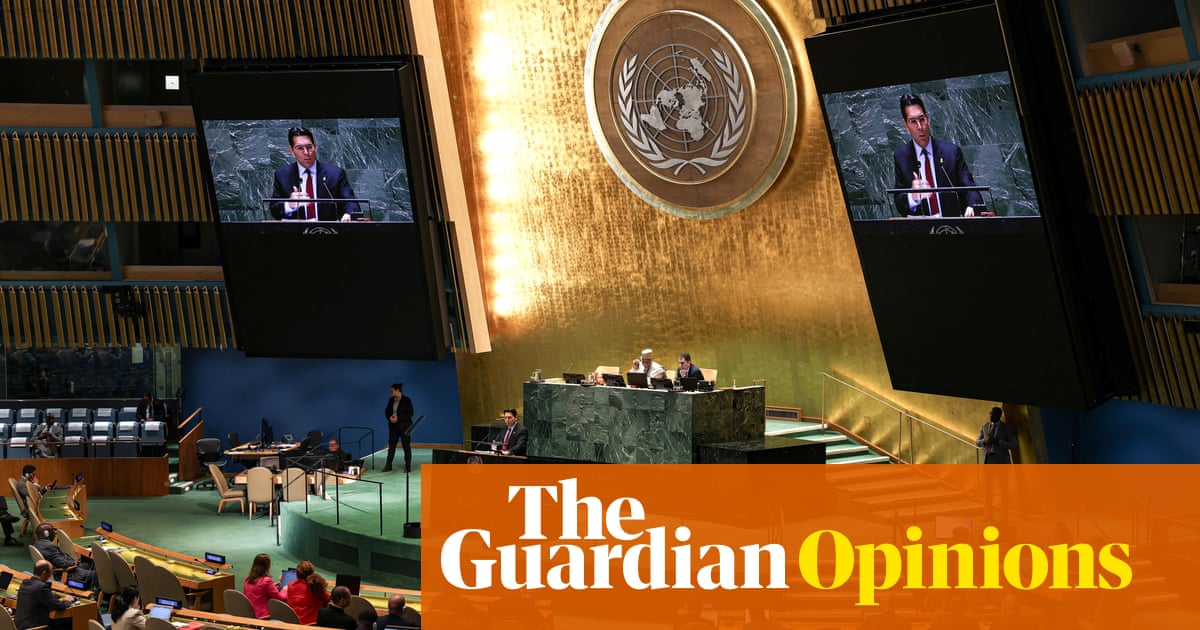Canada abstained when the United Nations general assembly (UNGA) overwhelmingly adopted a resolution calling for sanctions on Israel on 18 September 2024, objecting that the resolution “aligns with boycott, divestment, sanctions, which Canada firmly opposes”. This formulation, hypocrisy aside, actually turns the truth on its head. Launched in 2005, the non-violent, anti-racist BDS movement, inspired by the South African anti-apartheid struggle and the US civil rights movement, has consistently advocated for Palestinian rights in alignment with international law.
BDS calls for ending Israel’s illegal occupation and apartheid and upholding the right of Palestinian refugees to return and receive reparations. It is the UN general assembly that is finally beginning to “align” itself with the urgent task of applying international law consistently, even to Israel. As Craig Mokhiber, a former senior UN human rights official, puts it, the international court of justice (ICJ) ruling makes BDS “not only a moral imperative and constitutional and human right, but also an international legal obligation”.
Far from being yet another UN vote, this is historic. It is the first time ever that the UNGA has called out Israel’s apartheid regime and the first time in 42 years that it has called for sanctions to end its illegal occupation, as determined by the ICJ in July.
Many Palestinians and solidarity activists remain skeptical, however. Almost one year into Israel’s genocide against 2.3 million Palestinians in the occupied and besieged Gaza Strip, Israel is daily committing atrocities, showing an unprecedented level of perceived invincibility, or what even the meek UN secretary general calls, “total impunity”. In partnership with hegemonic western powers, led by the US, Israel is not only exterminating tens of thousands of Indigenous Palestinians but also bulldozing the very tenets of international law in the process.
Many UN human rights experts agree. In a statement issued on the same day, they said, the “edifice of international law stands upon a knife’s edge, with most States failing to take meaningful steps to comply with their international obligations reaffirmed in the [ICJ] ruling”. In order to comply with the ruling, states must impose sweeping economic, trade, academic and other sanctions on Israel’s illegal occupation and “apartheid regime”, they wrote, specifying a comprehensive military embargo as the most urgent.
As early as October 2023, days into Israel’s genocidal attack on Gaza, the Colombian president, Gustavo Petro, warned of the “unprecedented rise of fascism, and therefore, to the death of democracy and freedom … Gaza is just the first experiment in considering us all disposable.” In other words, “never again is now”, as progressive, anti-Zionist Jewish groups have said. This means that humanity’s most urgent priority now is to end Israel’s genocide, while recognizing that justice for Palestinians intersects and is intertwined with struggles for racial, climate, economic, gender and social justice.
The ICJ decisions, the UNGA’s historic vote and the UN experts’ statements all reflect a rising global majority that not only stands with the struggle for Palestinian emancipation but also with the fundamental mission of saving humanity, no less, from a “might makes right” era, unseen since the second world war, that is relegating UN institutions to the dustbin of history.
Regardless, Palestinians have no illusions whatsoever that justice will shine on us from the ICJ or the UN, the latter being historically responsible for the 1947-49 Nakba, the ethnic cleansing of most Palestinians, and the establishment of Israel as a settler-colony over most of the area of historic Palestine. The utter failure of the international legal system, dominated by Euro-American colonial powers, to provide the necessary, unambiguous, legally binding foundation for stopping the world’s first televised genocide, let alone delivering justice, speaks volumes.
We have international law on our side. We have the ethical high ground as an Indigenous people fighting a depraved, genocidal system of oppression to achieve our rights. Ethics and the law are necessary in our or any other liberation struggle, but they are never sufficient. To dismantle a system of oppression, the oppressed invariably need power as well: people power, grassroots power, intersectional coalition power, solidarity power and media power, among other forms.
In building people power, Palestinians are not begging the world for charity; we are calling for meaningful solidarity. But before both, we are demanding an end to complicity. The most profound ethical obligation in situations of dire oppression is to do no harm and to repair harm done by you or in your name.
As the struggle that ended apartheid in South Africa has shown, ending state, corporate and institutional complicity in Israel’s system of oppression, especially through the non-violent tactics of BDS, is the most effective form of solidarity, of building people power to help dismantle structures of oppression.
Almost a year into the genocide, some are complaining of “genocide fatigue”, however. But Palestinians, especially in Gaza, don’t have the luxury of “genocide fatigue”, as Israel continues to massacre, starve, and forcibly displace, committing what UN experts have identified as “domicide, urbicide, scholasticide, medicide, cultural genocide and, more recently, ecocide”.
Palestinians have never given up hope in our decades-old resistance to Israel’s ruthless regime of oppression. This boundless hope is rooted not in wishful thinking or a naive belief in some inevitable victory parachuting from the sky but in our people’s incessant sumud, insistence on our existence in our homeland, in freedom, justice, equality and dignity. It is also rooted in the inspiring growth of the global solidarity movement and its impact.
Also, as the British-Pakistani writer Nadeem Aslam says, “Despair has to be earned. I personally have not done all I can to change things. I haven’t yet earned the right to despair.” Unless you’ve earned that right, you have to keep organizing, keep hoping, keep ending complicity in your sphere of relative influence. With strategic radicalism, we can and shall prevail over the genocide, over apartheid, and over all this unspeakable oppression.

